The Kryptonite of Each Myers-Briggs® Personality Type
Welcome to the world of Myers-Briggs®, where every personality comes with its own unique kryptonite. In this article, we’re diving into the good, the bad, and the utterly bizarre aspects of each type’s weaknesses. We’ll explore what truly makes each of us tick—and what makes us ticked off. Let’s get started!
Not sure what your personality type is? Take our new personality questionnaire here. Or you can take the official MBTI® here.

The Kryptonite of Each Myers-Briggs® Personality Type
Table of contents
- The Kryptonite of Each Myers-Briggs® Personality Type
- ENFP: Consistency
- ENTP: Boredom
- INFP: Meaninglessness
- INTP: Emotions
- ENFJ: Criticism
- ENTJ: Sensitivity
- INFJ: Details
- INTJ: Over-Stimulation
- ESFP: Planning
- ESTP: Anticipating
- ISFP: Being Busy
- ISTP: Tact
- ESFJ: Bluntness
- ESTJ: Delicacy
- ISFJ: Change
- ISTJ: Spontaneity
- Want to Share Your Thoughts?
Estimated reading time: 20 minutes
ENFP: Consistency

ENFPs are all about ideas, evolution, possibility, and change. If you want an abundance of options and alternatives for your future, definitely seek these types out. Their kryptonite? Consistency and details. They are so in love with ideas that they can lose touch with the practical realities of achieving them. This means they tend to jump from one idea to another, fully intending to commit to each one, but then finding another one to chase once it starts getting dull. Focusing on one project for a very long period of time (unless it’s a fascinating new theory they’ve discovered) can be totally draining for them. They tend to be driven by ideas rather than practicalities, and this can actually cause them to struggle to achieve their dreams.
More ENFP Struggles:
- Rigid Structures: ENFPs thrive in flexible environments and detest rigid schedules or frameworks that stifle their creativity.
- Boredom: They have a low tolerance for monotonous tasks or routines that do not stimulate their imagination.
- Being Micro-Managed: Trust is crucial for ENFPs, and having someone oversee their every move can make them feel stifled and untrusted.
- Lack of Inspiration: They are fueled by passion and enthusiasm, so situations or conversations devoid of excitement or inspiration can leave them feeling drained and uninterested.
Find out more about ENFPs: The Dark Side of the ENFP Personality Type
ENTP: Boredom
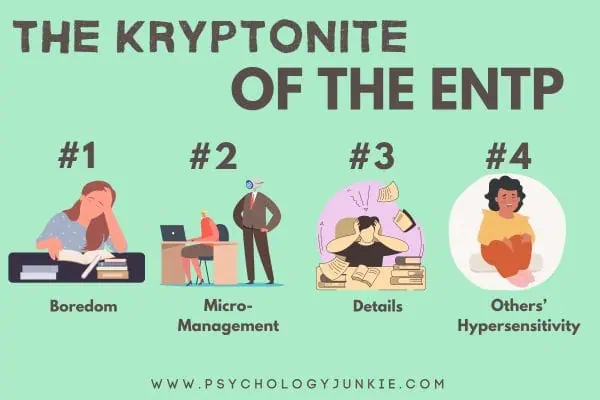
Similarly to ENFPs, ENTPs can struggle to zoom in on one idea and make it a reality. They see so many options before them and get so much joy from exploring ideas, that buckling down and finishing them can be tough. These Trailblazers are driven by the thrill of the chase and the excitement of discovery. Settling in for the long haul and checking off an item on a to-do list is far less satisfying. As a result they can get bored or distracted after working for a prolonged time on the same project. So many new and tempting possibilities tend to play on their mind, begging them to follow them down yet another rabbit hole. While many ENTPs (and ENFPs) achieve many of their goals, it usually requires personal growth and maturity for them to stay on track and not sidestep onto another new, interesting plan or possibility.
More ENTP Struggles:
- Micro-Managing: ENTPs crave autonomy, and being micro-managed makes them irritable and stifled creatively
- Details: They often overlook crucial details in favour of big-picture thinking, which can lead to problems in the execution of their brilliant ideas.
- Rigid Structures: ENTPs are happiest in environments that allow for flexibility and spontaneity; rigid schedules or systems can hinder their creativity and cause frustration.
- Other’s Sensitivities: ENTPs can sometimes overlook the sensitivities of others, as they are often more focused on their own ideas and pursuits. This can lead to unintentionally upsetting those who may be more sensitive to criticism or change.
INFP: Meaninglessness
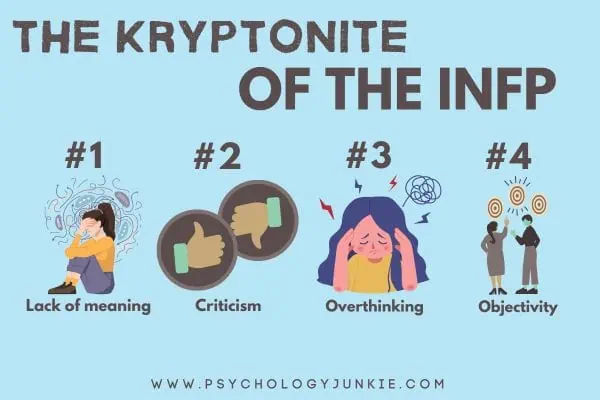
INFPs are on a lifelong quest for meaning and inner serenity. They are driven by deeply-felt personal values and are passionately committed to them. Their weakness? Doing anything that feels like it’s lacking in meaning. Day-to-day tasks, minutiae, or even work obligations that are about profits can feel wearying and draining. What to someone else might seem a simple chore can seem totally exhausting when it means they have to focus on something mundane at the expense of their lively imagination or deeper yearnings. This can mean that they struggle to finish task lists, blaming themselves and feeling paralyzed as a result.
More INFP Struggles:
- Conflict Avoidance: INFPs often shy away from confrontations, leading them to avoid necessary discussions that could resolve issues and improve relationships.
- Overthinking: Their rich inner world can lead to over-analysis and rumination, making it difficult for them to take action or make decisions, as they get caught in a cycle of “what if” scenarios.
- Disappointment with the Real World: INFPs have lofty ideals and a strong vision of how things should be, which can lead to disappointment when reality doesn’t align with their expectations.
- Dealing with Practical Details: While they excel at empathy and creativity, INFPs may struggle with mundane tasks or practical obligations. This can lead to procrastination or feeling overwhelmed by responsibilities, as they prefer to focus on their passions.
Discover more about INFPs: Understanding INFP Rage
INTP: Emotions
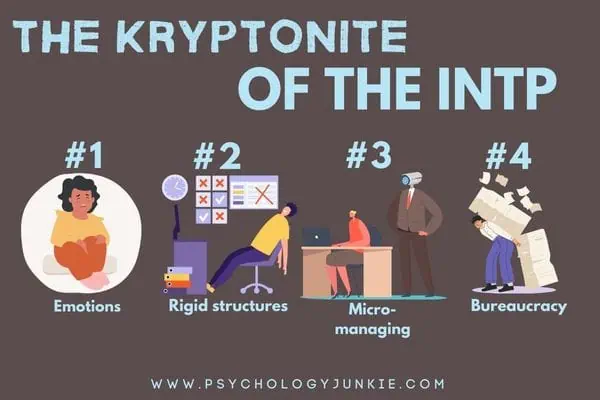
INTPs are intensely logical, analytical, and independent. They enjoy deep-diving into theories and experiments on their own and rarely need any hand-holding. Sometimes because of this they have little patience for people who can’t keep up with their way of thinking. Because their least-favored process is Feeling, they may at times seem tactless, oblivious, and out of touch with the needs of others. When they are forced to confront someone else’s emotions, it can feel overwhelming and draining for them. They may struggle to know how to handle the situation, what words to say, or how to improve someone else’s mood.
More INTP Struggles:
- Difficulty Expressing Feelings: INTPs often find it challenging to articulate their emotions, leading to misunderstandings in relationships and creating a distance between themselves and others.
- Procrastination: They may become so engrossed in analyzing ideas that they struggle to take action or meet deadlines.
- Over-analysis: INTPs can become trapped in their thoughts, getting bogged down in details and theories to the point where it hinders effective decision-making and progress.
- Dismissive of Authority: Given their independent mindset, INTPs may have a tendency to question or dismiss traditional authority, which can create tension in structured environments like workplaces or educational settings.
Find out more about INTPs: The Top 3 Best Matches for the INTP
ENFJ: Criticism
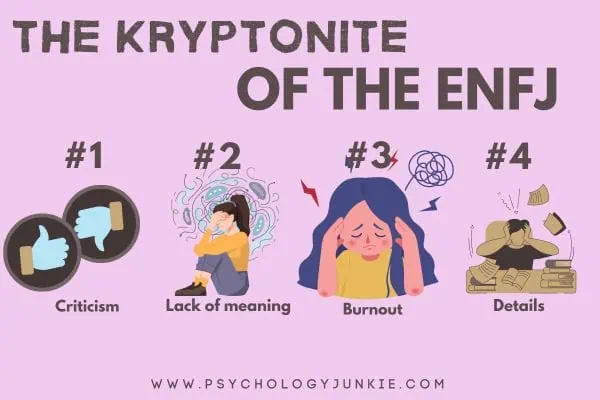
ENFJs tend to be deeply compassionate, emotionally aware individuals. They tune into the feelings of the people around them and can often anticipate their needs – especially emotional ones. But when it comes to seeing things objectively, ENFJs can struggle. While they have a logical side, they tend to focus instead on the emotional impacts of their decisions. They often find it challenging to decide on something that could affect others in negative ways. In an effort to maintain harmony they may phrase criticism in a way that confuses the person they are speaking with rather than getting the point across. They can also take on much more than they can handle in an effort to meet others’ needs.
More ENFJ Struggles:
- People-Pleasing: ENFJs’ desire to help others can lead to excessive people-pleasing, where they may neglect their own needs and well-being in favor of making others happy.
- Avoiding Conflict: To preserve harmony, ENFJs might avoid necessary confrontations, which can result in unresolved issues festering beneath the surface.
- Burnout: Their strong commitment to helping others, combined with a tendency to take on too many responsibilities, can lead to emotional and physical burnout.
- Value Shaming: ENFJs may unintentionally shame individuals who do not align with their values or beliefs. This can create an environment where those who feel misunderstood or judged may withdraw, leading to resentment and strained relationships.
ENTJ: Sensitivity
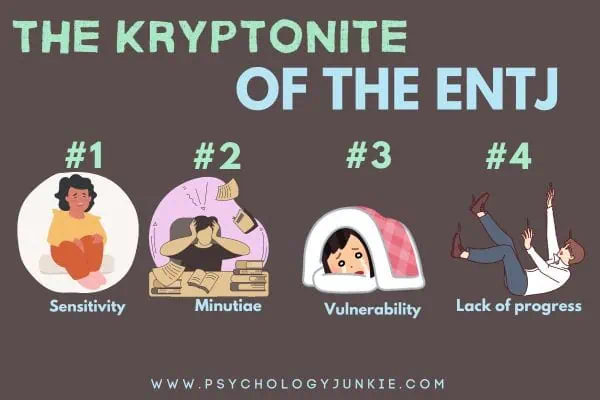
ENTJs are known for their insight, competence, and objectivity. But at times they can be a little (or a lot) out of touch with other people’s feelings. In an effort to get a job done, they may steamroll over other people’s emotions, being unaware of the impact they are having. They also can be inattentive and condescending if they have to listen to people talk who they believe have “trivial” or unimportant interests. For ENTJs, the big-picture and goals are what matter. Listening to someone tell about their day or the details of something more mundane can feel exhausting and dull to them. They can be extremely strong leaders, but working on some tact can help them to achieve their goals and motivate people much more quickly.
More ENTJ Struggles:
- Impatience: ENTJs want efficiency and results, which can lead to impatience with people who may not work at the same pace.
- Difficulty Listening: Their focus on achieving goals can make ENTJs less effective listeners. They may interrupt or redirect conversations to results-oriented topics, making others feel undervalued or ignored.
- Overconfidence: ENTJs tend to be strong-willed and self-assured, which can occasionally manifest as overconfidence. This mindset may lead them to overlook valuable input from others, creating a barrier to teamwork and collaboration.
- Struggles with Emotional Vulnerability: ENTJs often find it challenging to express their own emotions or show vulnerability. This can make it hard for them to form deep personal connections, as they may come off as distant or unapproachable to those seeking emotional intimacy.
INFJ: Details
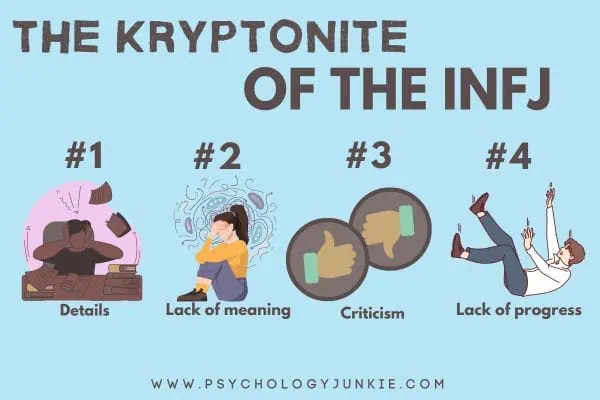
INFJs are famous for their insight, originality, and vision. They can forecast and predict and anticipate future realities. Their kryptonite? Dealing with the details of the moment. While they might be able to describe a detailed vision of the impacts of government corruption, they might forget that they need to eat. Or they may eat obliviously while they imagine the future and focus on concepts that are playing at their mind. They may also get so caught up in their perfect vision of how things should be that they are perpetually dissatisfied with the moment they’re in.
More INFJ Struggles:
- Overthinking: INFJs often find themselves caught in a cycle of overthinking, analyzing situations extensively to the point where it can lead to indecision and self-doubt.
- Fear of Conflict: Their strong desire for harmony can result in INFJs avoiding necessary confrontations, which may enable unresolved issues to fester and grow, complicating personal relationships.
- High Expectations: INFJs typically hold themselves and others to very high standards, which can lead to feelings of disappointment or frustration when those expectations are not met.
- Difficulty Accepting Help: Their independent nature often makes it hard for INFJs to reach out for or accept assistance from others. This could stem from a fear of burdening others or feeling vulnerable, leading them to struggle silently even when support is needed.
Discover more about the INFJ: Why INFJs Feel “Weird”
INTJ: Over-Stimulation
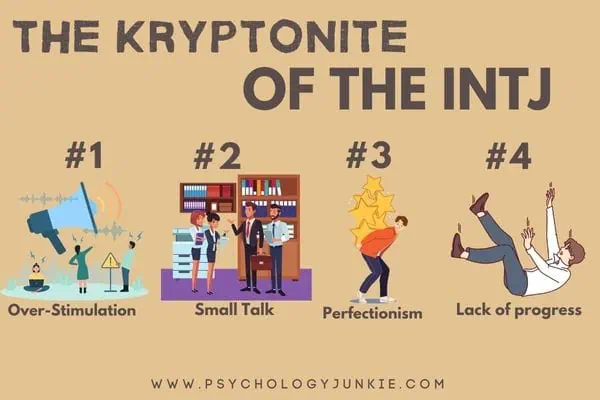
INTJs are strategic powerhouses with insights, ambition, and laser-focus on their goals. Their kryptonite? Staying present in the moment. Often they are so focused on their far-reaching ambitions or predictions that they lose touch with the moment. When they do become present, they often feel overwhelmed by the details around them. Fluorescent lights can feel painful, the mess can become overwhelming, aches and pains seem to erupt out of nowhere. During these moments of literally painful awareness, they tend to rush around trying to “fix” everything, clean everything, and organize their world, often to the point of exhaustion. Mindfulness practices and meditation can help INTJs to have more balance in this area.
More INTJ Struggles:
- Difficulty with Small Talk: INTJs often prefer deep, meaningful conversations over superficial chatter, which can make social interactions feel taxing.
- Perfectionism: INTJs have high standards for themselves and their work, which can result in perfectionism. This tendency may lead them to spend excessive time refining their ideas and projects, inhibiting their ability to complete tasks efficiently.
- Reluctance to Change Plans: INTJs put 110% of themselves into their plans and strategies, making them resistant to last-minute changes or even suggestions at times.
- Isolation: Their intense focus on their goals and ideas can lead to long periods of isolation, where INTJs may neglect personal relationships and social activities. This can potentially lead to loneliness or a lack of outside input.
Discover more about the INTJ: 10 Things You Crave Every Day as an INTJ Personality Type
ESFP: Planning
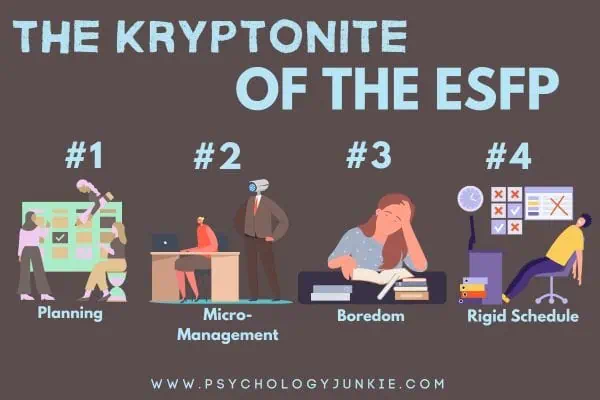
ESFPs are friendly, outgoing, and adventurous. Nobody knows how to create a good time and make people laugh like an ESFP (or perhaps an ENFP could match them). Their kryptonite? Mapping out and preparing for the future. They might “leap before they look” and wind up regretting it later. They can also find that, because they are so focused on the present, they over-commit to things that sound positive and then become exhausted later trying to keep up with everything they signed up for. Many ESFPs I’ve known have run into financial difficulties because they didn’t put aside earnings into savings accounts. Over time, the impulsive, fun-loving nature of the ESFP can backfire in unforeseen challenges.
More ESFP Struggles:
- Difficulty with Long-Term Commitment: ESFPs thrive in the moment and often find it challenging to commit to long-term goals or relationships.
- Overreliance on External Validation: Their desire to be liked and to create a positive atmosphere may drive ESFPs to seek approval from others, making them overly dependent on feedback.
- Struggle with Routine: ESFPs often resist rigid routines or structures, preferring to live life spontaneously. This can lead to disorganization in their daily activities.
ESTP: Anticipating
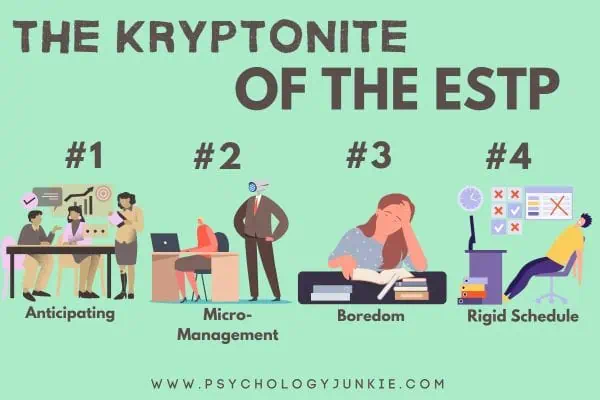
The ultimate realists, ESTPs thrive when they can be in the moment, fully present and available for anything exciting that could happen. They are pragmatic, logical, and level-headed, but they have a weakness as well. Their weakness is that they tend to focus so much on “now” that they forget to deal with “later.” The hunger for adventure and activity can lead them to become overly impulsive and forgetful of the long-term implications of their actions. They may also forget to stop and analyze the big picture and what’s really important in the grand scheme of things.
More ESTP Struggles:
- Difficulty with Intense Emotions: ESTPs often prefer to tackle practical matters over emotional discussions, which may create barriers in relationships that require emotional vulnerability and depth.
- Resistance to Structure: Their preference for flexibility can make it challenging for ESTPs to follow schedules or plans.
- Tendency to Avoid Long-Term Planning: ESTPs are often focused on immediate experiences and may struggle with considering future goals, leading to missed opportunities or a lack of direction.
- Overly Competitive: ESTPs thrive on excitement and challenge, which can push them into a highly competitive mindset. This drive to excel and outperform others may lead to unnecessary rivalry, overshadowing collaboration or causing them to push themselves too hard to “win.”
ISFP: Being Busy

ISFPs are realistic, compassionate, and creative. They pursue their values and causes with action rather than words, showing intense loyalty and commitment to what they believe in. But one thing they absolutely hate? Having their schedule all filled up. They crave openness, freedom, and a sense that they can adjust to life based on the needs and desires of the moment. When their life feels too scheduled or planned they can feel paralyzed, unable to make forward progress because they feel so trapped.
More ISFP Struggles:
- Conflict Avoidance: Due to their desire for harmony and dislike of confrontation, ISFPs may avoid addressing conflicts in relationships or situations, leading to unresolved issues.
- Struggle with Decision-Making: ISFPs tend to weigh all possible options before making a decision, which can make it challenging for them to commit or take action.
- Discomfort with Long-Term Planning: ISFPs find long-term planning daunting, as their focus is predominantly on the present moment and immediate experiences. This can lead to difficulty in visualizing future scenarios or outcomes.
Find out more about ISFPs: Why ISFPs Struggle with Loneliness, and How to Cope
ISTP: Tact
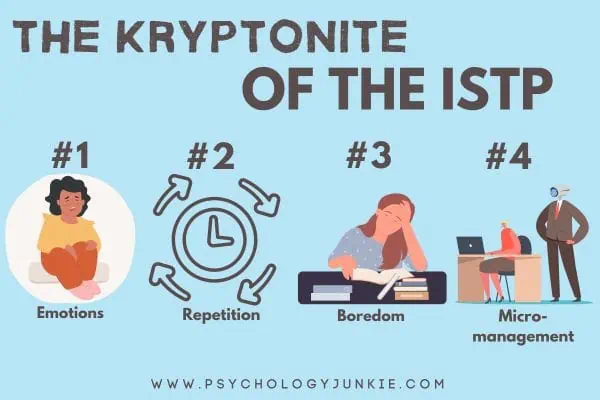
ISTPs are the lone wolves of the personality world—independent, practical, and analytical. They thrive in the moment, tackling challenges with quick, clever solutions that make you wonder if they have a secret superpower. But here’s the catch: when it comes to feelings, they can at times stumble around like a toddler in a giant shoe store. They might come off as tactless or a bit dismissive when someone’s feeling all the feelings, which can lead to those awkward “let’s just avoid each other” moments.
More ISTP Struggles:
- Difficulty Expressing Emotions: ISTPs often find it challenging to articulate their feelings, which can lead to misunderstandings in relationships and a perception of emotional aloofness.
- Impatience with Routine: ISTPs like things spontaneous and flexible. Being roped into a repetitive routine feels like a slow death.
- Tendency to Dismiss Others’ Feelings: ISTPs prioritize logic over emotion, sometimes unintentionally invalidating the feelings of others, which may create distance or resentment.
Discover more about ISTPs: 12 Amazing Fictional ISTPs
ESFJ: Bluntness
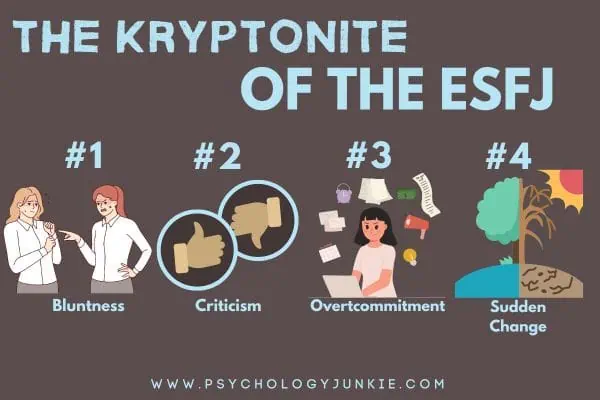
ESFJs are those super warm, considerate friends who always have a plan and a snack ready. They’re practical and fiercely loyal, which is great. But when it comes to being direct or having someone be blunt with them? This is their kryptonite. So, when it comes to evaluating situations, they might end up taking things way too personally. Even if someone meant no harm, they might feel insulted because someone was so direct and blunt with them. Constructive criticism might be interpreted as a personal attack. On the flip side, they may struggle to give criticism directly, sandwiching it between praise at moments when a more blunt approach is needed.
More ESFJ Struggles:
- Overcommitment: ESFJs have a strong desire to help others, which can lead to taking on too many responsibilities and struggling with burnout.
- Difficulty Setting Boundaries: Their caring nature may cause them to struggle with saying no, resulting in personal needs being overlooked in favor of others’.
- Need for Social Approval: They can become overly concerned with how they are perceived by others, leading to anxiety and pressure to maintain a positive image.
ESTJ: Delicacy

ESTJs are incredibly organized, logical, and analytical. They naturally are drawn towards management or leadership roles and are great at spotting and fixing mistakes. However, they can struggle with understanding others’ feelings since they don’t prioritize emotions. This might lead them to overlook what others value, causing rifts in relationships. Sometimes, they might come off as bossy or demanding because they easily spot and point out flaws and inefficiencies. Their brain is naturally wired to notice any problems in their vicinity and to try to correct them. But at times this can make them seem overly-critical and harsh.
More ESTJ Struggles:
- Rigidity in Thinking: ESTJs adhere strongly to their traditional values and tried-and-true methods, which can limit their adaptability and hinder creative problem-solving.
- Difficulty with Empathy: ESTJs may prioritize logic over emotional considerations, making it hard for them to connect with others on a deeper emotional level.
- Struggle with Flexibility: Their preference for structure and predictability can cause resistance to change, making it challenging for them to embrace new ideas or unexpected shifts in plans.
ISFJ: Change
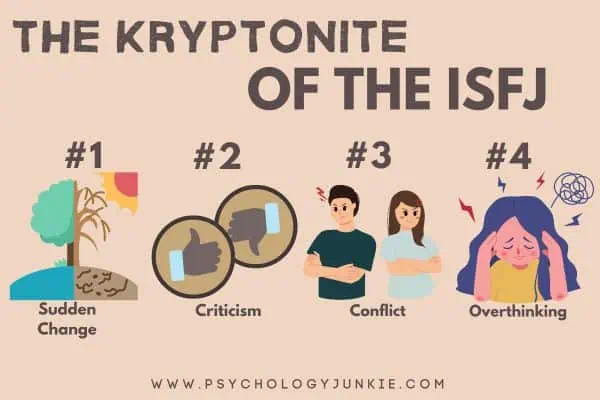
ISFJs are warm, empathetic, and consistent types. When faced with change, they might feel like startled deer in headlights, frozen in a mix of bewilderment and panic. ISFJs often cling to the familiar like a life raft; change can feel like being tossed into a churning sea without a flotation device. They might respond with a strong urge to retreat to a blanket fort, surrounded by comforting things, as a way to cope. This struggle with change can lead to stress and uncertainty, making it vital for them to remember that adaptability is a skill that can be developed—like learning to ride a bike, provided they just hold tight to the handlebars and keep pedaling.
More ISFJ Struggles:
- Difficulty Accepting Criticism: Their strong sense of duty and personal investment in their work can make it hard for ISFJs to receive criticism without feeling personally attacked.
- Overthinking: ISFJs can become caught up in their thoughts, especially when thinking about past mistakes, replaying them again and again, leading to self-doubt and overwhelm.
- Fear of Conflict: In their desire to maintain peace, ISFJs may shy away from addressing necessary confrontations, allowing issues to fester rather than resolve them.
Find out more about ISFJs: The ISFJ Personality Type and the Enneagram
ISTJ: Spontaneity
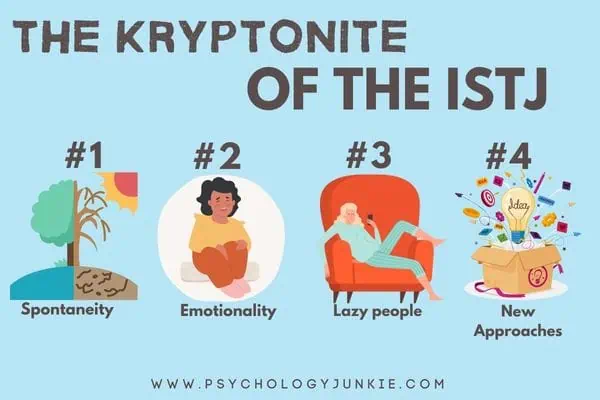
ISTJs are the kinds of people who have a plan for everything. Knowing what to expect, strategizing, and charting the course all keep life stable and happy for them. A life of consistency, meaning, and tranquility appeals to them. But in this desire for tranquility and consistency, they can run from spontaneous or impulsive ideas like the plague. Want them to suddenly stop what they’re doing and go somewhere new? You might as well have asked them to swallow a toad! Making sudden changes, being surprised, and being put on the spot can all make them feel anxious, alarmed, and overwhelmed.
More ISTJ Struggles:
- Resistance to Change: ISTJs often prefer established routines and methods, which can lead to difficulty in adapting to new situations or changes in their environment.
- Overly Critical of Themselves: Their high standards and sense of responsibility may lead ISTJs to be harsh self-critics.
- Difficulty Expressing Emotions: ISTJs tend to prioritize logic and practicality over emotional expression, making it challenging for them to convey their feelings to others.
Discover more about ISTJs: The Childhood Struggles of ISTJs
Want to Share Your Thoughts?
Do you agree or disagree with this article? We’d love to hear your insights, experiences, and stories! Let us know in the comments.
Find out more about your personality type in our eBooks, Discovering You: Unlocking the Power of Personality Type, The INFJ – Understanding the Mystic, The INTJ – Understanding the Strategist, and The INFP – Understanding the Dreamer. You can also connect with me via Facebook, Instagram, or Twitter!










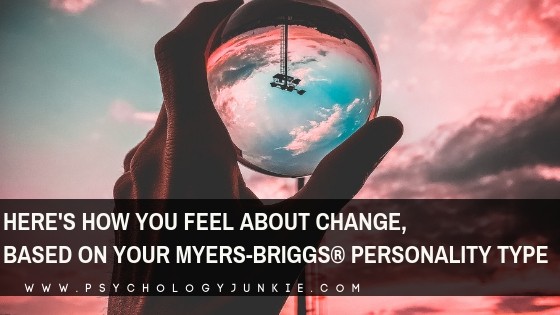


Pretty accurate!